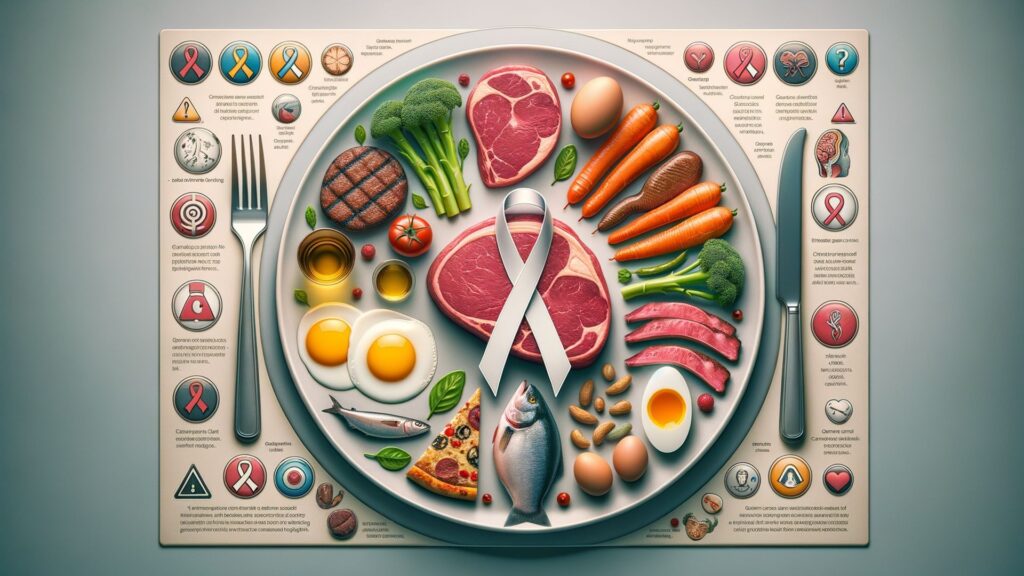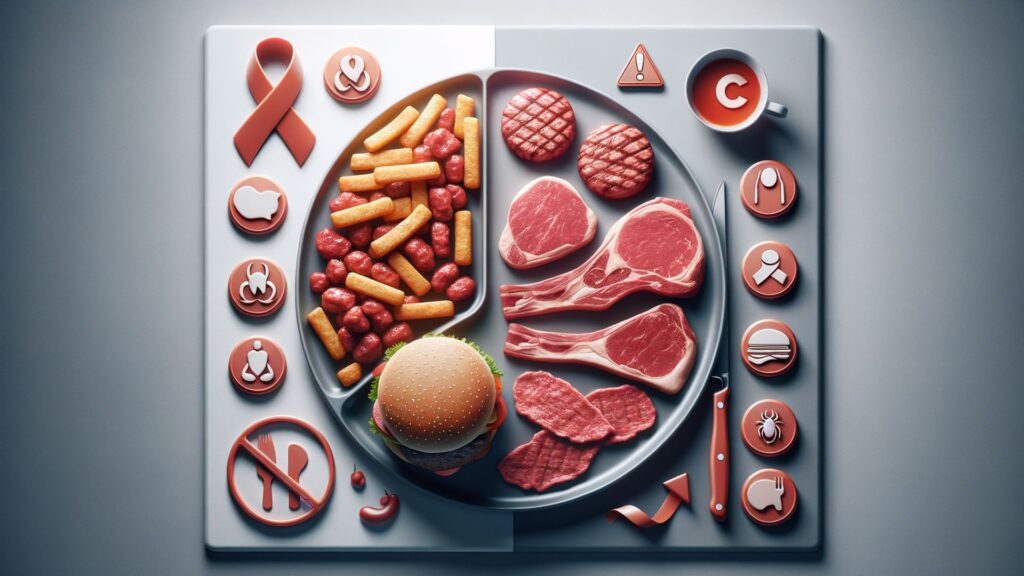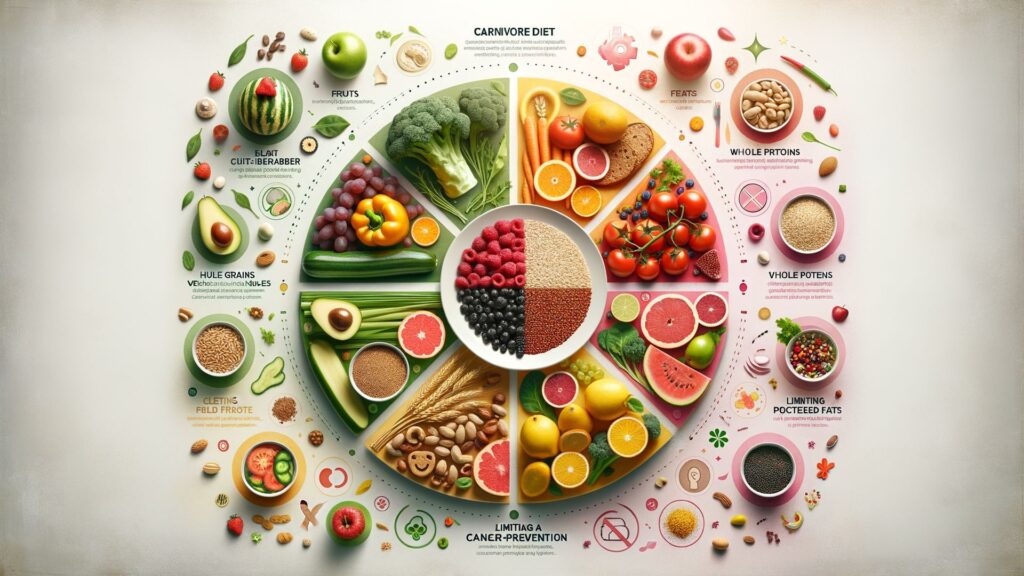Carnivore Diet and Cancer Risk: What You Need to Know
The carnivore diet has gained significant attention in recent years as a dietary approach focused exclusively on animal products. Proponents of this diet often claim various health benefits, but it is essential to scrutinize its implications, particularly concerning cancer risk. This article delves into the relationship between the carnivore diet and cancer, examining the available research, dietary components, and expert opinions to provide a comprehensive understanding of this controversial dietary choice.

What is the Carnivore Diet and Its Relation to Cancer Risk?
Understanding the Basics of the Carnivore Diet
The carnivore diet is characterized by the exclusive consumption of animal products, including red meat, poultry, fish, and animal-derived foods such as eggs and dairy. This diet eliminates all plant-based foods, including fruits, vegetables, grains, and legumes. Advocates argue that by adhering to a high-fat diet consisting primarily of meats, individuals can achieve various health benefits, including weight loss and improved mental clarity. However, the lack of variety in this diet raises concerns about potential deficiencies in essential nutrients typically obtained from a balanced diet rich in fruits and vegetables. Understanding these foundational aspects is crucial when considering the role of the carnivore diet in cancer risk.
How Does the Carnivore Diet Impact Cancer Risk?
The relationship between the carnivore diet and cancer risk is complex and requires careful consideration. While some studies suggest that high consumption of red meat and processed meat may be linked to an increased risk of certain types of cancer, including colorectal cancer and prostate cancer, the specific impact of a strictly carnivorous diet remains unclear. The diet’s high-fat content, particularly from saturated fats found in animal products, has raised questions about its potential to promote the development of cancer cells. Moreover, the absence of plant foods, which are known to possess protective properties against cancer, may further exacerbate the risk of developing malignancies. Thus, it is essential to explore the current research to ascertain the implications of the carnivore diet on cancer risk.
Current Research on Carnivore Diet and Cancer
Current research on the carnivore diet and its direct correlation with cancer risk is limited, though some studies provide valuable insights. Research from institutions like the Harvard T.H. Chan School of Public Health has indicated that high amounts of red and processed meat consumption may increase the risk of developing specific cancers, particularly colorectal cancer due to the presence of n-nitroso compounds that arise during the processing of meat. While the carnivore diet claims to offer a simplistic approach to nutrition, it remains imperative to consider the potential drawbacks of excluding a variety of food groups that could contribute to cancer prevention. Although further investigation is needed to comprehensively understand the long-term health effects of the carnivore diet, existing evidence suggests a cautious approach.
Does Eating Red Meat Increase Cancer Risk?
The Evidence Linking Red Meat to Cancer
Extensive research has established a connection between the consumption of red meat and an increased risk of several types of cancer, particularly colorectal cancer. Multiple epidemiological studies have shown that individuals who consume high amounts of red meat regularly are at a greater risk of developing cancer compared to those who limit their intake. The mechanisms behind this association may involve the presence of certain compounds in red meat, such as heme iron and various fatty acids, which can contribute to oxidative stress and inflammation, both of which are known risk factors for cancer. As such, it is crucial for individuals following a carnivore diet to be aware of these risks and consider moderation in their meat consumption.

Processed Meat and Its Role in Cancer Risk
Processed meat, which includes products such as bacon, sausages, and deli meats, has been classified by the World Health Organization as a Group 1 carcinogen, indicating sufficient evidence of its carcinogenicity in humans. The processing methods often involve the addition of preservatives and other chemicals that can increase the risk of cancer. For individuals adopting the carnivore diet, the consumption of processed meats can further heighten the risk of developing various cancers, including colorectal and stomach cancers. It is essential for those on this diet to differentiate between unprocessed and processed meats and make informed choices to mitigate associated health risks.
How Much Red Meat is Safe to Consume?
Determining the safe amount of red meat consumption is a contentious topic among health professionals. While some studies suggest that limiting red meat to less than 18 ounces per week can significantly reduce the risk of cancer, others emphasize the importance of a balanced diet that incorporates a variety of food sources. For individuals on the carnivore diet, the exclusive focus on red meats can lead to excessive intake beyond recommended levels. Therefore, it is advisable to consider not only the quantity of red meat consumed but also the quality, opting for grass-fed or organic sources when possible. Additionally, integrating a variety of animal products can help provide a more balanced nutrient profile while potentially minimizing cancer risks.
Can a High-Fat Diet Like the Carnivore Diet Help with Cancer Treatment?
Exploring the Role of Diet in Cancer Treatment
The role of diet in cancer treatment is an area of growing interest among researchers and medical professionals. While a high-fat diet, such as the carnivore diet, may have certain therapeutic benefits for some cancer patients—particularly in terms of weight management and metabolic health—there remains a lack of consensus regarding its efficacy as a standalone treatment. Diet may influence cancer treatment outcomes by impacting inflammation, insulin levels, and overall energy balance, all of which can affect cancer cell growth. However, it is crucial to approach dietary modifications in conjunction with conventional cancer treatments and under the guidance of healthcare providers.
Potential Benefits of a High-Fat Diet for Cancer Patients
Some cancer patients may experience appetite loss and weight degradation due to their treatment protocols, often leading to malnutrition. A high-fat diet, such as the carnivore diet, might offer a solution by providing calorically dense options that can help maintain weight and support overall energy levels. Additionally, the potential anti-inflammatory properties of certain fats may contribute to improved well-being during treatment. Nevertheless, it is essential for cancer patients to consult with their healthcare team before making any significant dietary changes to ensure that their nutritional needs are met while minimizing any risk of adverse health effects.
What Doctors Say About Diet and Cancer Treatment
Many healthcare professionals emphasize the importance of a balanced diet in supporting cancer treatment and recovery. While some may acknowledge the potential short-term benefits of high-fat diets, they often recommend a more varied approach that incorporates fruits, vegetables, and whole grains, which provide essential nutrients and antioxidants known to combat cancer cell proliferation. The consensus among medical experts is that while dietary strategies may play a role in cancer treatment, they should complement rather than replace established medical therapies. Therefore, individuals considering the carnivore diet should engage in discussion with their healthcare providers to devise a tailored nutritional plan that aligns with their treatment goals.
How Does the Carnivore Diet Affect Colorectal and Prostate Cancer?
Understanding Colorectal Cancer Risks with High Meat Consumption
Colorectal cancer has been associated with high meat consumption, particularly red and processed meats. The mechanisms underlying this association may include the production of harmful compounds during digestion and metabolism. High-fat diets, such as the carnivore diet, can exacerbate these risks by promoting an environment conducive to the development of colorectal cancer. Additionally, the exclusion of fiber-rich foods, which play a critical role in digestive health and cancer prevention, may further elevate the risk of colon cancer in individuals adhering to the carnivore diet. Thus, it is vital for individuals to consider these factors when evaluating their dietary choices.
The Connection Between Prostate Cancer and Diet
Prostate cancer is another area of concern when discussing the carnivore diet. Studies have indicated that high consumption of red meat and dairy products may correlate with an increased risk of developing prostate cancer. The reasons behind this association may involve hormonal factors and the inflammatory response triggered by high-fat diets. As such, individuals adhering to the carnivore diet should remain vigilant regarding their potential risk for prostate cancer and consider the implications of their dietary choices on their long-term health.
Preventive Measures and Dietary Changes
To mitigate the risk of colorectal and prostate cancers, individuals may benefit from adopting preventive dietary measures. Although the carnivore diet emphasizes animal products, incorporating a wider variety of foods, including plant-based sources of nutrients, can enhance overall health and potentially reduce cancer risk. This could involve balancing meat consumption with moderate amounts of fruits and vegetables known for their cancer-fighting properties. Acknowledging the importance of dietary diversity is crucial in the pursuit of cancer prevention.
What Should You Consider About Diet and Cancer Prevention?
The Importance of a Balanced Diet in Cancer Prevention
A balanced diet is fundamental to cancer prevention and overall health. Nutritional guidelines typically advocate for the consumption of a diverse range of foods, emphasizing the importance of fruits, vegetables, whole grains, and healthy fats. These food groups offer vital nutrients and antioxidants that can help combat oxidative stress and inflammation, both of which play a role in cancer development. While the carnivore diet may provide certain benefits, it ultimately lacks the diversity required for optimal health and cancer prevention.

Diet Benefits Beyond Cancer Risk
Beyond cancer risk, a well-rounded diet provides numerous health benefits, including improved cardiovascular health, better weight management, and enhanced immune function. The consumption of fruits and vegetables, for instance, has been linked to lower rates of chronic diseases and improved longevity. Therefore, considering a balanced approach to diet, rather than an exclusive focus on high-meat consumption, can yield significant health benefits beyond cancer prevention.
Fitness Influencers Swear by the Carnivore Diet: Should You?
While fitness influencers often promote the carnivore diet as a means to achieve specific fitness goals, it is crucial to approach such claims with skepticism. Personal anecdotes and testimonials may not reflect the broader implications of long-term adherence to a diet devoid of plant-based foods. Individuals should critically evaluate the information presented by influencers and consider the potential health risks associated with exclusive consumption of animal products. It is advisable to consult with healthcare professionals when contemplating significant dietary changes to ensure that individual nutritional needs are met and to mitigate any risks related to cancer and other health conditions.
Carnivore Diet And Cancer Is There A Connection Frequently Asked Questions:
Q: What is the relationship between a high fat diet and the risk of cancer?
A: Research indicates that a high fat diet, particularly one that contains high amounts of saturated fat and cholesterol, may influence the risk of cancer. Certain studies suggest that excessive consumption of saturated fats can lead to adverse health effects, including potential tumor growth.
Q: Can eating meat increase my risk of cancer?
A: The consumption of large amounts of meat, especially processed meats, has been associated with an increased risk of certain types of cancer according to the National Institutes of Health. However, the relationship is complex and can depend on various factors, including the type of meat consumed and the overall dietary pattern.
Q: How does a carnivore diet affect gut health in relation to cancer risk?
A: A carnivore diet primarily consists of animal foods and lacks plant-based foods that contain beneficial polyphenols and fibers. This dietary pattern may negatively affect gut health, which is linked to inflammation and cancer risk. A balanced diet that includes a variety of food groups is typically recommended for optimal gut health.
Q: What role do animal foods play in cancer development?
A: Animal foods, particularly when consumed in high amounts, may contribute to cancer development through mechanisms such as the formation of heterocyclic amines during cooking. These compounds have been shown to have carcinogenic potential in mouse models.
Q: Is there a connection between ketosis and cancer risk while following a high fat diet?
A: Ketosis, a metabolic state achieved through a low-carbohydrate, high fat diet, may have both protective and detrimental effects in relation to cancer. While some studies suggest that ketosis can inhibit tumor growth, others indicate that high amounts of saturated fat could potentially increase cancer risk.
Q: How should one approach the amounts of meat consumed in their diet?
A: It is advisable to make sure you’re consuming moderate amounts of meat, focusing on lean cuts and incorporating a variety of protein sources. Consulting with a registered dietitian can provide personalized guidance on how to balance meat consumption within your overall diet.
Q: What is the significance of lactic acid in the context of a high fat diet and cancer?
A: Lactic acid is a metabolite that can be produced during glycolysis, which may be influenced by dietary patterns. Some studies suggest that high fat diets can lead to elevated levels of lactic acid, which could have implications for cancer progression, but further research is needed to fully understand this relationship.
Q: Are there any specific studies that highlight the cancer risks associated with a high fat diet?
A: Yes, new studies conducted by leading researchers, including professors of epidemiology and nutrition, have examined the links between high fat diets and cancer risk. These studies often focus on various cancer types and the impact of different dietary patterns on tumor growth.
Q: What dietary changes are recommended to potentially lower cancer risk?
A: To potentially lower the risk of cancer, it is recommended to adopt a balanced diet that includes a variety of fruits, vegetables, whole grains, and lean proteins, while limiting high amounts of saturated fat and processed meats. Engaging with health professionals can help tailor dietary changes to individual health needs.




